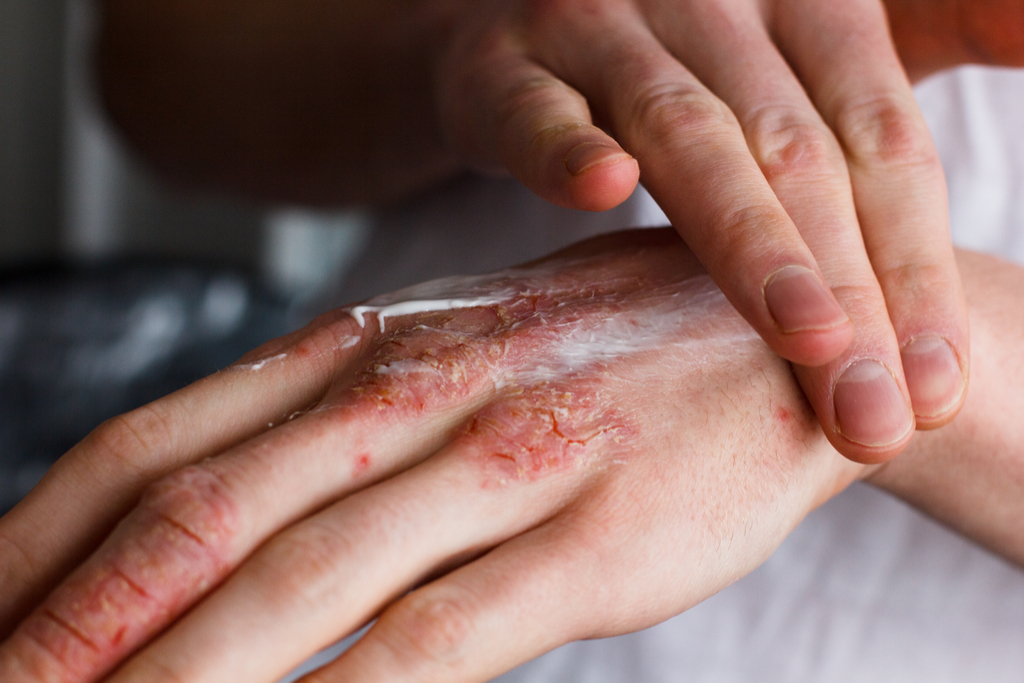
Xerosis is the medical term used to categorize dry or chapped skin. It is derived from Greek ‘xero’, which means dry and ‘osis,’ which denotes ‘disease’ or ‘medical disorder’.
Most people are vulnerable to Xerosis or dry skin during several stages of their lives. It happens due to lack of moisture in the skin, which could result in aging.
If nothing is done to cure dry, tight or chapped skin, the condition may become worse. If left untreated, your skin becomes rough, flaky, scaly, and itchy. Southlake Dermatology can help you in understanding the various factors behind your skin condition and provide suitable solutions tailored to your skin health and needs, regulate symptoms, improve skin condition and prevent future onset of Xerosis. When you feel uncertain about your skin condition, contact Southlake Dermatology for correct, one-on-one diagnosis and relevant treatment plan.
It’s not a good idea to take everything in your own hands. Using several products for treatment could only exacerbate skin conditions. Southlake Dermatology assesses your skin conditions and health and provides prescription drugs that would be appropriate for your skin type. Not every product would suit your skin. The chemicals and preservatives in products may cause a reaction and aggravate dry skin.
It’s important to understand how dry skin works – what causes it and how it should be treated. If you have naturally dry skin, it means that your skin cannot regulate moisture content as well as normal skin can. There are three factors that affect your skin’s capacity to regulate water content in upper layers: the efficiency of skin’s protective barrier, its ability to minimize water loss due to evaporation, and the effectiveness of molecules in epidermal layers of the skin. Compared to dry skin, normal skin can adapt to the hydration requirements of skin. Southlake Dermatology can help you in determining whether you have naturally dry skin or whether environmental factors caused your skin to become dry. There are endogenous and exogenous factors that can result in the skin becoming dry.
How do I know I have it
People may experience acute or chronic dry skin conditions. There are various factors that can help retain skin moisture. You can tell that your skin is becoming dry when you notice the following signs:
- Roughness: this happens when your skin cells start dying at a fast rate. You would notice a thick layer of dead cells on the skin’s surface, causing it to feel rough.
- Flaky skin happens when large scales peel off from the epidermis and resemble dust.
- Tightness happens when the layer of the skin becomes dry and feels tight, resulting in increased number of dead skin cells.
- Dryness leads to itchiness due to tight skin. When you feel the need to scratch, it indicates poor functioning skin and extent of dryness.
Some areas of the body tend to dry out faster than the rest of the body areas. If you develop any of these symptoms, contact Southlake Dermatology for correct diagnoses and expert advice.
How did I get it
- Prolonged exposure to harmful UV radiation intensifies rate of water evaporation from skin and cause skin to dry out. This is why sun exposure could lead to premature aging and prevent cell rejuvenation. Longer hours of sun exposure might result in fine lines and wrinkles. You can protect your skin by limiting your exposure to the sun, avoiding going outdoors when the sun rays are at their peak and wearing good-quality sunblock that suits your skin, for which Southlake Dermatology can provide information. The sun rays interact with melanin – a natural chemical in your skin, which absorbs UV radiation and prevents damage and well as give a skin tan. You get sunburned when sun exposure exceeds the amount of available melanin.
- Lack of cleansing or exfoliation could damage your skin’s protective layer and remove its natural lipids, which function to retain moisture. Moreover, over-washing or exfoliation also damages the skin’s natural protective barrier.
- Your skin also tends to become dry due to low humidity levels, which occurs during extremely hot summer seasons or cold winter seasons.
- As far as endogenous factors are concerned, certain medicines, health disorders, dietary regimen and age cause your skin to become dry. When you are not receiving adequate nutrients, your skin dries out. Dehydration increases chances of your skin drying out at a faster rate.
What can I do?
When it’s a serious condition and keeps getting worse or when no treatment is working, seek consultation with Southlake Dermatology. Southlake Dermatology would assess your background and the possible factors contributing to the dryness. You would also be provided with comprehensive information about the nature of the skin condition and a skincare regimen for cleansing, exfoliation, and hydration.
- Avoid hot showers. Hot water has calming effects especially if have had a tiring day but it can also dehydrate the skin by removing the natural moisture and affecting the skin’s protective barrier. Rather than potting in moisture, hot water is only pulling out moisture. Prolonged and frequent hot water showers could damage your skin cells and speed up aging.
- Watch the products that your use. These include your body washes and soaps. Anti-bacterial detergents could in fact strip your skin off its natural, essential oils. Harsh soaps, washes, and detergents could irritate your skin. When it comes to lotions, moisturizers, and body washes, go for mild, light-fragranced products to protect your natural skin.
- Keep your skin hydrated. Drink adequate water to prevent your skin from drying out. Moisture with good quality products. Seek help from Southlake Dermatology for products that are better suited for your skin. When one product doesn’t work, you quickly switch to other products, preventing the skin from adjusting and increasing risks of dryness. It’s better to have your skin examined and receive proper information from Southlake Dermatology.
Other than that, you could use home-made natural masks of aloe vera, honey or yoghurt to treat dry skin. During winter, keep your skin moisturized, especially the elbows and feet and heels, which are the most neglected body areas. A healthy diet is essential for collagen production, maintaining skin tissues, and enhancing moisture levels. Sleeping well helps your skin cells rejuvenate and prevent aging. If the symptoms start changing, seek help from Southlake Dermatology. When you are not getting relief, seek professional advice. Compassion Dermatology in Southlake, TX can examine your skin and provide the right products for relief.


